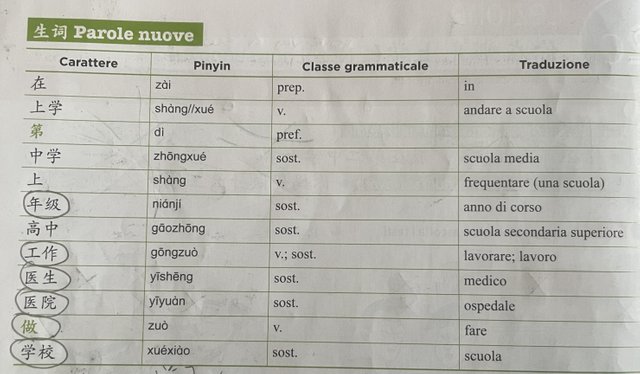🇨🇳LEZIONE DI CINESE UNITÀ 2C - CHINESE LESSON UNIT 2C🇨🇳
Ciao a tutti amici di Steemit, siamo alle porte di luglio, come vi è andato il mese di giugno? Anche da voi fa caldissimo?
Oggi andiamo avanti con le nostre lezioni di cinese infatti iniziamo subito l’unità 2C.
Iniziamo guardando i caratteri
• zài/在 da solo è una proposizione e significa “in” funge anche come complemento di stato in luogo.
• shàng//xué/上学 è un verbo e significa “andare a scuola”
• dì/第 è un prefisso e per avere significato si unirà ad altre parole, per esempio se vogliamo dire “primo” diremo “第一“
• zhōngxué/中学 è un sostantivo e significa “scuola media”
• shàng/上 è un verbo e significa “frequentare”
• niánjí/年级 è un sostantivo e significa “anno di corsi”
• gāozhōng/高中 è un sostantivo e significa “scuola secondaria superiore”
• gōngzuò/工作 è sia un verbo che un sostantivo e significa “lavorare/lavoro”
• yīshēng/医生 è un sostantivo e significa “medico/dottore”
• yīyuàn/医院 è un sostantivo e significa “ospedale”
• zuò/做 è un verbo e significa “fare”
• xuéxiào/学校 è un sostantivo e significa “scuola”
Guardiamo ora insieme i dialoghi
🗣️DIALOGHI🗣️
Primo dialogo
• A : 你在哪儿上学? che significa “Dove vai a scuola?”
• B : 我在第二中学上学 che significa “Io sono alla scuola scuola media numero due”
• A : 你上几年级? che significa “che anno frequenti?”
• B : 我上高中二年级 che significa “io frequento il secondo anno di scuola superiore”
Secondo dialogo
• A : 你爸爸在哪儿工作? che significa “tuo papà dove lavora?”
• B : 他是医生,他医院工作 che significa “lui è un dottore, lavora in ospedale”
• A : 你妈妈做什么工作? che significa “tua mamma che lavoro fa?”
• B : 我妈妈在学校工作, 她是老师 che significa “mia mamma lavora in una scuola, lei è una maestra”
Ora invece guardiamo insieme la grammatica.
📕GRAMMATICA📕
• Come abbiamo detto prima zài/在 oltre che ad essere una preposizione, ha anche il compito di formare il complemento di stato in luogo.
• Per quanto riguarda i complementi nominali in cinese, vanno sempre messi PRIMA del verbo a cui si riferiscono, mentre in italiano solitamente va messo dopo.
Infatti in italiano diremo :
IO : soggetto LAVORO : predicato verbale IN OSPEDALE : complemento di stato in luogo.
In cinese cambia, infatti diremo :
我 : soggetto (io) 在医院 : complemento di stato in luogo (in ospedale) 工作 : verbo (lavoro)
Ora vi allego qui sotto la successione dei caratteri sui quali potete esercitarvi.
Come sta andando il vostro apprendimento del cinese? Avete consigli su come migliorare le lezioni?
Grazie mille per aver letto il mio post e alla prossima!
⚠️Le fotografie sono tutte di mia proprietà⚠️
Fotocamera : iPhone 12 pro
🇬🇧ENGLISH VERSION🇬🇧
Hello to all Steemit's friends, we're at the gates of July, how was your June? Is it very hot at your hot too?
Today we are going ahead with our Chinese lessons in fact we are starting the 2C unit right away.
Let's start by looking at the characters
• zài/在 alone is a proposition and means "in" it also acts as a complement of state in place.
• shàng//xué/上学 is a verb and means "to go to school"
• say/第 is a prefix and to have meaning it will join other words, for example if we want to say "first" we will say "第一"
• zhōngxué/中学 is a noun and means "middle school"
• shàng/上 is a verb and means "to frequent"
• niánjí/年级 is a noun and means "year of courses"
• gāozhōng/高中 is a noun and means "upper secondary school"
• gōngzuò/工作 is both a verb and a noun and means "to work/work"
• yīshēng/医生 is a noun and means "doctor/doctor"
• yīyuàn/医院 is a noun and means "hospital"
• zuò/做 is a verb and means "to do"
• xuéxiào/学校 is a noun and means "school"
Now let's watch the dialogues together
🗣️DIALOGUES🗣️
First dialogue
• A : 你在哪儿上学? What does it mean "Where do you go to school?"
• B : 我在第二中学上学 which means "I'm in middle school number two"
• A : 你上几年级? What does "which year do you attend?"
• B : 我上高中二年级 which means "I attend the second year of high school"
Second dialogue
• A: 你爸爸在哪儿工作? What does "where does your dad work?" mean?
• B : 他是医生,他医院工作 which means "he is a doctor, he works in the hospital"
• A : 你妈妈做什么工作? What does "your mom's job mean?"
• B : 我妈妈在学校工作, 她是老师 which means "my mother works in a school, she is a teacher"
Now instead we look at the grammar together.
📕GRAMMAR📕
• As we said before zài/在 in addition to being a preposition, it also has the task of forming the state complement in place.
• As for nominal complements in Chinese, they should always be put BEFORE the verb to which they refer, while in Italian it should usually be put after.
In fact, in Italian we will say:
I : subject Labour : verbal predicate IN HOSPITAL : complement of state in place.
In Chinese it changes, in fact we will say:
我 : subject (I) 在医院 : complement of state in place (in hospital) 工作 : verb (work)
Now I attach below the sequence of characters on which you can practice.
How is your Chinese learning going? Do you have any advice on how to improve the lessons?
Thank you so much for reading my post and see you next time!
⚠️The photographs are all my property⚠️
Camera: iPhone 12 pro





ottima spiegazione , sopratutto l ultima foto mi ricorda un po come ai bambini delle elementari si faceva fare le lettere in stampatello e corsivo per memorizzare meglio il carattere !
con dedizione e esercizio sicuramente si potrá imparare al meglio
Ciao @maricryptochic, sii,anche a me ha subito ricordato i libri che mi davano alle elamentari dove bisognava ripassare i tratteggi per fare le lettere.
Assolutamente sì! Con la dedizione e l’esercizio si può sempre imparare, grazie mille per il commento e alla prossima
Thank you!!!